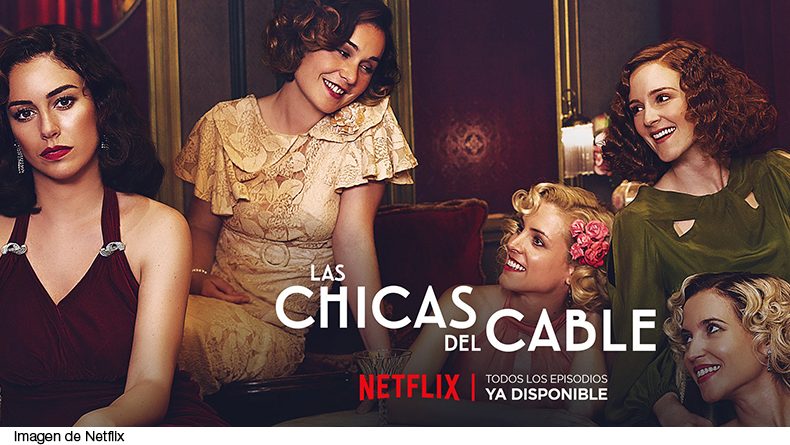These days, if you couldn’t tell already, I’ve been doing a lot of writing, and not just in English. In Spanish and in Portuguese, too, as you’ll see this month. A few months ago for my Spanish class, I had to write about a series I was watching or had already watched, and how could I not pick one of Netflix’s current feminist series? Las chicas del cable, or The Cable Girls, features a group of women living in Madrid in pre-Civil War Spain, when women still had freedom (ish, because how much freedom did they really have?) to live their lives on their own terms. Below is the piece I wrote for my class, and my loose translation into English.
In today’s society, although it’s slowly changing, there is still a lack of representation of women in media across the board: TV, movies, radio, etc. Man’s voice, and thus his perspective, has always been more powerful and his representation overarching, but series like Netflix’s The Cable Girls is changing that. It follows a group of women who work at a telephone company in Madrid in the 1920s.
From the first scene, when the protagonist witnesses the murder of her best friend who is trying to escape an abusive relationship, one can tell that it is a historical drama. From her screams and sobs, viewers can guess that pain, grief, and suspense will be some of the numerous themes throughout the show, although the most significant one is friendship, and the strength of women supporting women.
The show also demonstrates the important role that women had in that time in Spain and especially in Madrid, because they made the first telephone call, and all the others after that, possible. For many women, this was their first opportunity to work outside of the home, and it is remarkable to see just how many took advantage of it, and were eager to embrace their first chance at independence before the dictatorship eventually came and invoked the censorship of women’s roles and their subsequent oppression all over the country.
Along with providing this glimpse into the lives of women in this time, the series itself is dynamic, with an authentic wardrobe for the period and actors with Madrid-accented Spanish—and fantastic subtitles too! 😉 It can be quite depressing to watch what the women go through; everything from physical abuse to rape to everyday sexism is par for the course, but watching these women support and defend each other and their right to their voices and the freedom to make their own decisions is not only its redemption, but their vindication, too. It is for all of us.
Representation is important now more than ever, and series like Las chicas del cable are imperative to constructing our future through remembering our past and the women who struggled before us.
~~~
En estos tiempos modernos, aunque esté cambiando poco a poco, todavía hay una falta de representación de las mujeres en todas los medios: televisión, películas, radio, etc. Siempre ha sido más poderosa la voz y la representación de los hombres, sin embargo, las cosas van cambiando, y la serie de Netflix, Las Chicas del Cable, es un ejemplo muy fuerte de ello. Se trata de un grupo de telefonistas, todas mujeres, que tienen trabajo en una empresa de telecomunicaciones en Madrid en los años 20.
Es un drama histórico, que se adivina ya en la primera escena, cuando la protagonista ve con sus propios ojos el asesinato de su mejor amiga. Se escuchan sus gritos y sollozos de dolor profundo, algo que, aunque no se sepa todavía, será un tema repetido durante toda la serie. Pero sobre todo, por los momentos buenos y los malos, Las Chicas del Cable muestra el verdadero significado de la amistad, y lo que pasa cuando las mujeres se apoyan mutuamente.
También demuestra el papel importante que tenían las mujeres en esta época en Madrid, pues sin las mujeres trabajadoras, no habría sido posible comunicarse por teléfono, algo que además y para muchas de ellas, supuso la primera posibilidad que tenían de trabajar fuera de casa. Esta oportunidad de trabajar fuera de casa, les dio más movilidad y más libertad en la España de aquella época, antes de que empezara la dictadura, que traería la censura y la opresión de todas las mujeres del país.
Además de proveer esta mirada a la vida de las mujeres de esta época, es una serie dinámica, con un vestuario auténtico, actores con acento madrileño, y un guión creíble de la realidad de aquellos años. Sin embargo, resulta raro que la banda sonora no sea también de la época. Pues, en lugar de escoger música propia de los años 20, todas las canciones son actuales, lo que para los espectadores es un poco chocante. A pesar de este desliz, no se puede ignorar el hecho de que esta serie hace un trabajo importantísimo al reivindicar las voces de la mujer en la sociedad de hoy en día.


